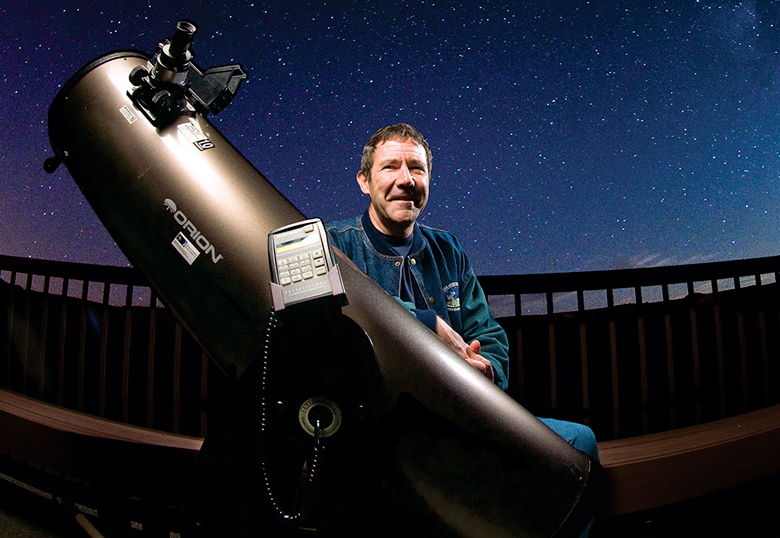A more effective way to give skin grafts to burned children. Advanced materials for producing safer and more robust airplanes and cars. A computer-assisted device for performing neurosurgery that is guided by real-time MRI brain scans. The potential to meet humankind’s growing energy needs through the safe production of nuclear power.

These are just a few examples of the many current and emerging innovations that have been made possible by space exploration, says University of Lethbridge astrophysicist Dr. David Naylor.
Naylor is a physics and astronomy professor at the U of L and a Board of Governors Research Chair. He is also the director of the Space Astronomy Division of the Institute for Space Imaging Science, a collaborative initiative between the U of L, University of Calgary and Athabasca University. Over the last two decades, Naylor has led Canada’s involvement in the Herschel/SPIRE and SPICA/Safari space missions; previously, he worked at the European Space Agency on the ISO/LWS mission.
“With space exploration missions costing upwards of $10 billion, I’m often asked, ‘Why invest in space exploration when there are so many problems here on Earth?’”
As Naylor discussed as part of the U of L’s PUBlic Professor Series, probing the mysteries of the universe ultimately leads to countless direct and indirect benefits for society.
“There are literally tens of thousands of useful developments and inventions that have come out of space programs,” says Naylor. “Money that is spent on space research goes largely toward the salaries of talented individuals who make such things as rocket engines, life support systems, diagnostic instrumentation, electronics and communications systems. Out of their work come a whole variety of new technologies. When we do basic research in this area, industry can run with it in so many different directions."
The direction of Naylor’s own career in space research was determined more than 30 years ago when, after finishing his PhD in Physics at the University of Calgary, he completed a research fellowship at a European Space Agency centre in the Netherlands. The experience resonated with his deep interest in the workings of the world, both on Earth and in the stars above us.
Since joining the U of L in 1981, he has established an internationally recognized research program in the area of experimental astrophysics. He has also actively recruited over 300 students to his laboratory, seven of whom who have gone on to become professors in their own right, three of whom hold research Chairs.
Among his most current projects is cryogenic testing of equipment destined for space to ensure it works at very low temperatures. The research will be performed in a new first-of-its-kind facility in Canada that just received $150,000 in funding from the Canadian Foundation for Innovation. Cooling scientific instruments to extremely low temperatures is essential to realize the sensitivity limits of today’s state-of-the-art detectors. In turn, these instruments will allow astronomers to probe the farthest reaches of the universe, and answer fundamental questions such as how the first stars and galaxies formed.
As Naylor notes, many innovations have come about as a result of space research. This area of science has led to advancements in everything from laser eye surgery, to artificial limbs, to breast cancer detection, to water purification, to firefighting equipment.
A less tangible but also important benefit of space research, Naylor says, is the stronger respect gained for the Earth’s status as the universe’s only life-sustaining sphere, which he says can encourage us to more peacefully co-exist with each other and better protect the planet. As well, he says the insights gained from investigating outer space satisfy what he sees as a universal and unstoppable human instinct to better understand our world and our place within it.
“We are different from other animals, we have always had the exploration gene. Ever since people left the African savannah and spread into Europe, they have gone into every corner of the globe,” he says. “This exploration is something that’s a part of who we are...It helps us answer the bigger questions about how the universe and life began, how the world was created and whether we are alone.”
